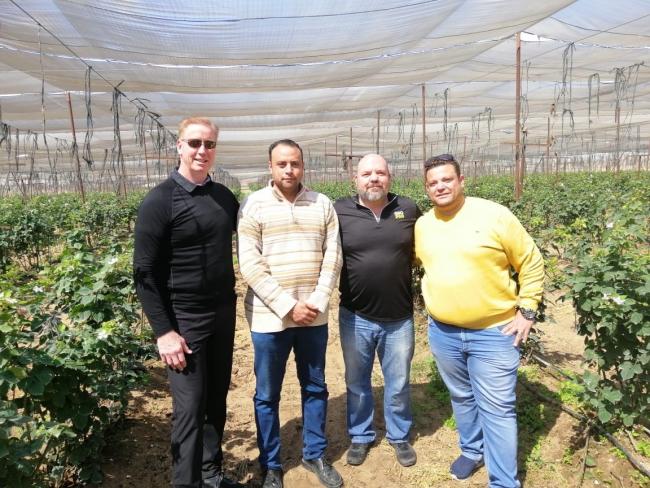PICO Company: Egypt to produce more high-quality citrus
James Ronan, CEO of GROPRO (USA) discussed with Eng. Alaa Diab, CEO of PICO Group, and Reda Shehata, Trade Manager of PICO, about the latest developments in Egyptian citrus production and exports. PICO Group is one of the leaders of Egyptian fruit market, company produces and exports a wide range of products, including citrus.

Eng. Alaa Diab, CEO of PICO Group
James Ronan: Please tell me more about the achievements of your county in the global citrus market?
Eng. Alaa Diab: It is believed that the original habitat of citrus is tropical regions, and sub-tropical in southeast Asia, i.e. India, Chinese India, and southern China, and from there it spread to other parts of the world, and in general citrus cultivation is spread between the latitudes of 35 north and south, except for grapefruit that endures this harsh climate, citrus fruit is considered the main fruit crop in Egypt.
Five Egyptian regions in four governorates occupy the first place in the production of citrus crops compared to other crops and compared to the rest of the provinces, both in terms of the total area of cultivated land and fruit areas, and the amount of production. These areas are Nubaria, where the cultivated area reached 141,563 acres areas (with annual production about 1,4 million tons). While Al-Buhaira Governorate tops the second place after Nubaria with a production amount of 0,6 million tons of fruitful area of 59,674 acres.
Egypt topped the list of exporters of oranges for the second year in a row, amounting to 1.68 million tons, with the support of improved products with the development of irrigation methods and the low cost of labor and the value of the pound, which reduced the export price. Egypt ranked first in the list of orange exporters in 2019, surpassing Spain, the first producer of citrus crops around the world. Egypt overtook Spain for the second year in a row in orange exports, with quantities of 1.68 million tons, out of 1.8 million tons which is the total Egyptian citrus exports. Also, Egypt exported quantities of lemon by 70 000 tons, mandarin 35,000 tons, and grapefruit 15,000 tons.
Reda Shehata: Let me add more impressive facts - Egypt ranks sixth in the world in citrus production in general, with quantities amounting to 3.42 million tons in the 2018-2019 season, with growth of approximately 7% over the previous season's crop, but it ranked first in export for the second time in a row.
James Ronan: Could you please tell me a bit about PICO's citrus production areas…
Eng. Alaa Diab: The PICO Company has diversity in crops, among which is citrus crops. We cultivate citruses in two different areas - Giza Governorate, Berquash Farm, and Beheira Governorate, Fatteh Farm, both areas are 500 acres. There is a diversity of varieties within each farm to follow climatic conditions, pathogens, the quality of fruits, and others that affect the quality of the crop.
James Ronan: Are the climate and soil conditions of Egypt suitable for citrus cultivation?
Eng. Alaa Diab: Citrus can be successfully cultivated in all types of soils from sandy to clay; but good nutrition and sanitation should be provided. The best types of citrus soil are well-drained, deep alluvial yellow lands, which provide and avoid the cultivation of citrus trees in soils where the groundwater level is less than 1.5 m from the surface of the earth at any time of the year, in which the soil is free of carbonate, bicarbonate, chloride, and sodium. The soil pH affects the extent to which trees benefit from micronutrients. Citrus cultivation is affected when the soil pH is less than 5 or more than 8.5 Plant citrus cultivation in neutral lands (p = 7) or close to parity.
James Ronan: What are the main citrus diseases in Egypt?
Reda Shehata: It’s several groups of pest issues, we face in citrus production here. First of all, its insect and mite diseases, including crustacean insect and powdery bugs, aphid, fruit fly, citrus rust mites and leaf minor. Also, big headache for citrus producers here are nematode diseases, including citrus nematode (Tylenchulus sp), lesion nematode (pratylenchus sp), digger nematode (Xiphenema sp) etc. And don't forget about soil-born diseases (Phytophthora sp, Fusarium sp, etc), as well as fungi issues etc. That's why crop protection is a very important question. We in PICO company are sure that creating an effective and sustainable pest control management system is a main competitive advantage for citrus producers in Egypt.
James Ronan: How do you organize a crop protection system on your farms? Do you use bio crop protection products?
Eng. Alaa Diab: PICO farms own approximately 7000 acres divided into farms, Beheira Governorate, three farms, and Giza Governorate, two farms. There is a diversity in the company's crops in terms of fruit varieties, so it also makes them vulnerable to a wide variety of different plant diseases. Most of the crops available in the company target the European market and the Gulf region. Therefore, the company is pursuing safe agriculture by using integrated pest management (IPM) methods, PICO uses safe pesticides, approved by the European Union. In parallel, the use of pesticides is rationalized and exchanged by mechanical control some insect pests - like electric traps, pheromone traps. Besides, we increase usage of biological control in the fight against many diseases, including fungal, insect, and nematode. The selection of bio-compounds is done by international standards and laboratory analysis, as the company has a laboratory in which soil analysis (nematode, plant pathology and nutrients lab) and evaluation of biocides are carried out, then the company's research and development committee monitors the results field and evaluates them. So, we can confirm that PICO is providing high-quality citruses, produced according to the highest international standards of food safety. We believe in sustainable agriculture and we are proud to produce and export natural citruses to many countries of the world!
More info: http://picoagriculture.com/, www.groproag.com

Meeting of PICO and GROPRO teams March 2020, Egypt
 Information for fruit and vegetables business in CIS
Information for fruit and vegetables business in CIS